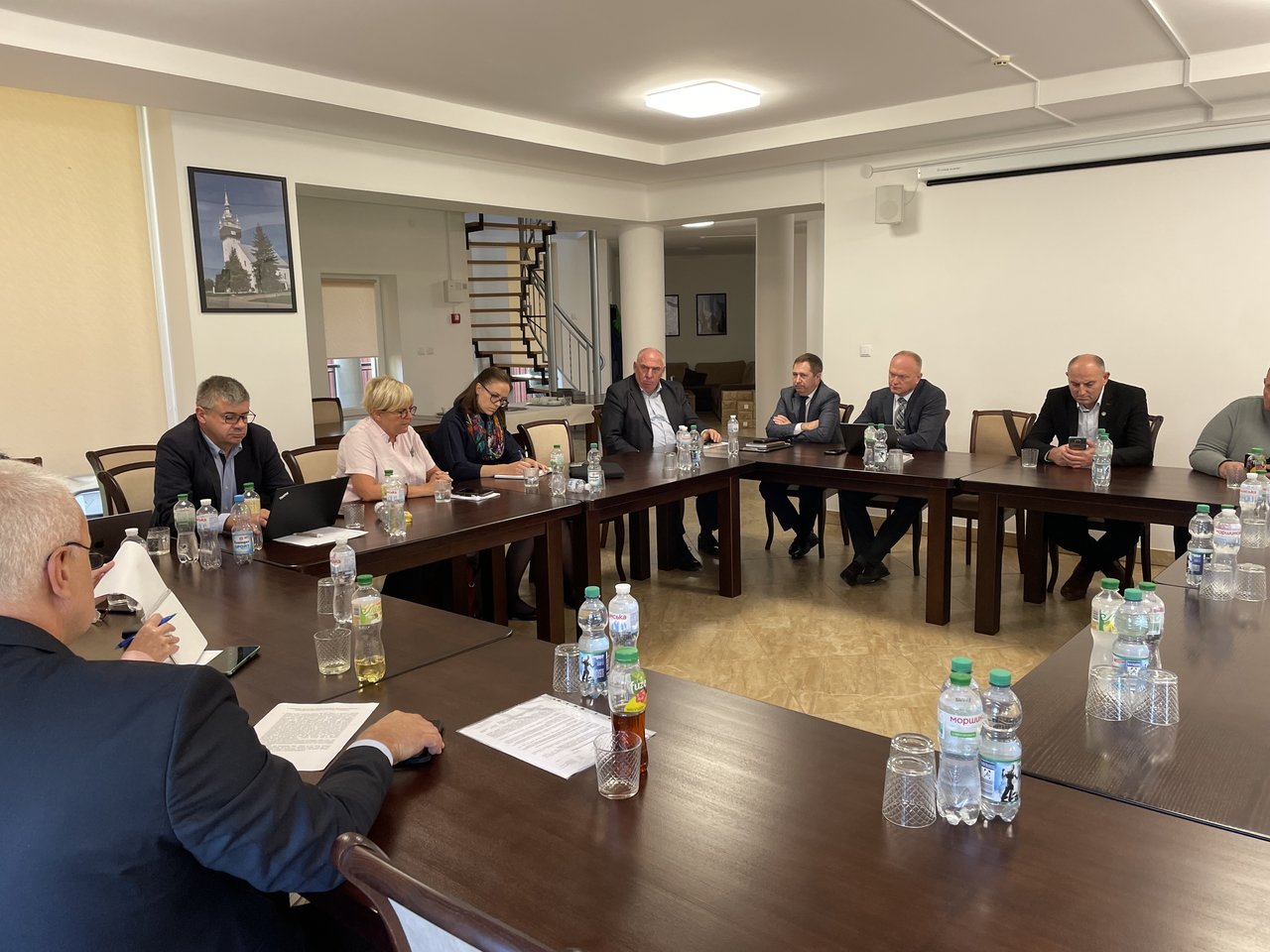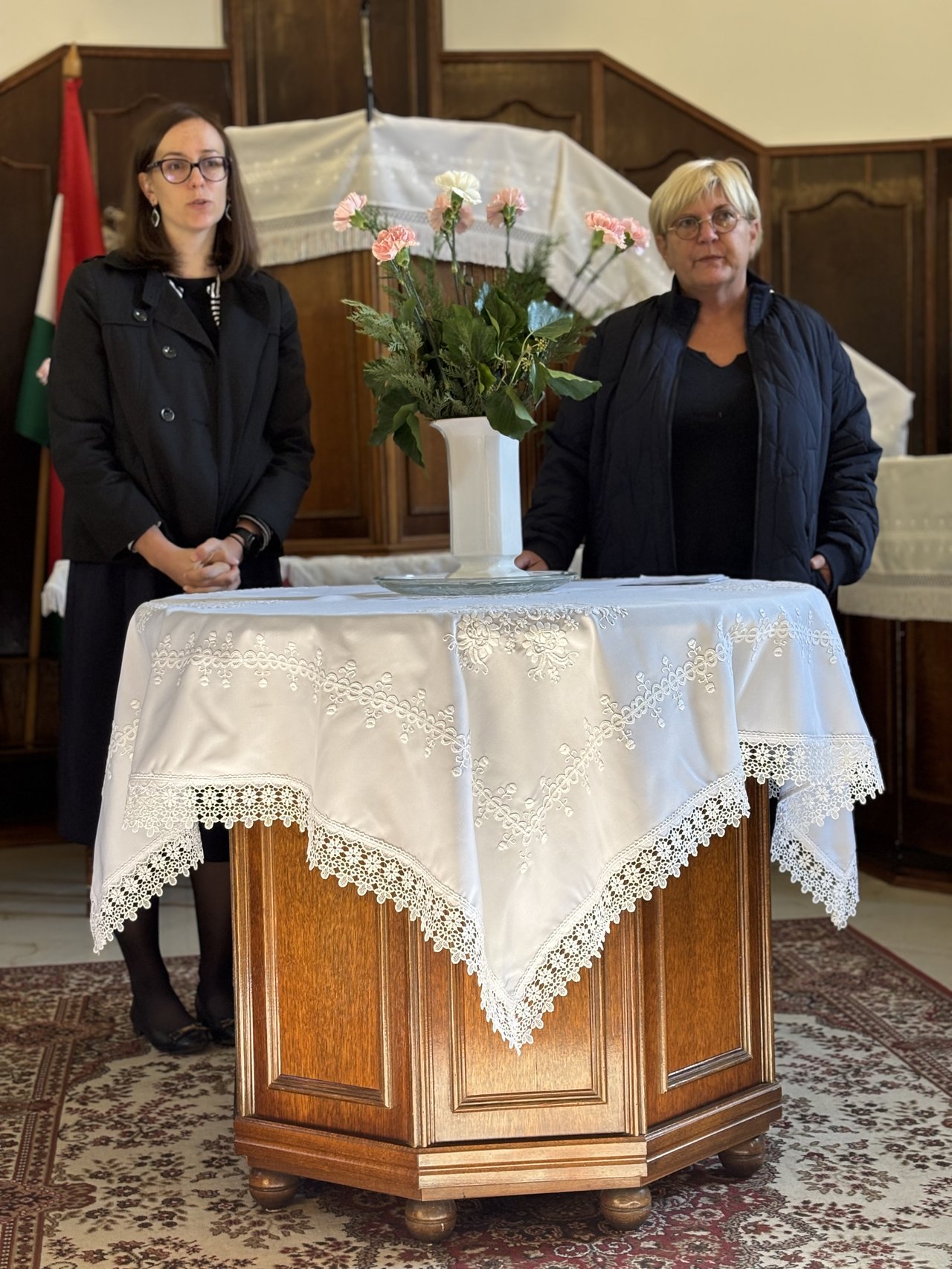Martina Wasserloos-Strunk, President of the World Communion of Reformed Churches-Europe (WCRC), visited the reformed church in Hungary and the Reformed Church in Transcarpathia (RCT) to meet with various church representatives in her capacity as president.

Meeting with representatives of RCT
Between October 10 and 13, Martina Wasserloos-Strunk, President of WCRC Europe, visited Budapest and Transcarpathia to meet with church leaders and lay representatives of the RCH and RCT to discuss the situation in both churches. The visit included discussions on the activities and issues facing the RCH and RCT, including the consequences of the war in Ukraine on the church community and the importance of ecumenism in Europe.
In Budapest, Wasserloos-Strunk met with Rev. Szabina Stojka, head of the Roma Ministry of the HRCA. Here, Stojka presented the strategy of the Roma Ministry of the Hungarian Reformed Church Aid. The primary aim of the Roma Ministry is to help Hungarian-Roma reconciliation in congregations and to build inclusive communities where both majority Hungarians and Roma people can feel at home. Stojka explained how the project has a very practical approach, with a framework rooted in a theological foundation emphasising witness, community, and charity. The final aim of the project is the realisation of diversity and inclusion on the community level. Stojka emphasised the holistic approach of the project, saying that it is a privilege to neglect forgiveness, and it is important that everyone contributes to the success of the overall community.
Wasserloos-Strunk also met with Bishop József Steinbach, the Ministerial President of the Synod of the RCH. Bishop Steinbach extended his greetings and appreciation for the visit from the WCRC Europe president. The bishop highlighted three areas where the RCH is grateful to the WCRC, as well as areas where there is still a need for support and dialogue. Foremost, as the war in Ukraine continues, the Reformed Church in Transcarpathia continues to face difficulties and obstacles arising from the conflict. With the possibility of pastors being drafted, church communities across the region face numerous pressures and rising anxiety. Additionally, Bishop Steinbach conveyed thanks on behalf of the RCH for the support and solidarity of reformed communities across Europe as the church faced challenges throughout a period of transition at the beginning of 2024. As the RCH looks forward into the future, this support is important. Bishop Steinbach also highlighted the importance of honest dialogue between churches, saying that it is inevitable that individuals form opinions regarding contexts different to their own based on what they hear and read and that this situation also affects churches. The RCH is committed to continuing an honest dialogue with its international partners; it is important that discourse continue regarding various issues and challenges as well as recognising that sometimes we have different understandings and perspectives.

Martina Wasserloos-Strunk greets the congregation of Búcsú at the Sunday worship service
From 11 October to 13 October, Wasserloos-Strunk visited with various representatives of the RCT and its Diaconal Coordination Office and participated in a women’s event in a local congregation. On 12 October, a meeting with Bishop Zán-Fábián of the RCT and the deans and lay presidents of local presbyteries convened. Here, Bishop Zán-Fábián reported on several important developments and challenges in the RCT. Among those challenges are the rising costs of food, gas, and other essential items. Recently, the government raised the military tax, which places a burden on schools and church institutions. Additionally, there is a rising sense of anxiety among the pastors, who are concerned that religious clergy will be drafted into the war, forcing them to leave their church communities. Despite the challenges, the RCT continues to operate its social institutions, serving the vulnerable and marginalised and providing an essential network of support for its communities. Notably, the RCT distributed over 1,000 back-to-school packages for children entering school. Bishop Zán-Fábian shared that despite the hardships the church faces, the number of children entering school is a hopeful sign.
The deans and lay presidents of the local presbyteries presented brief introductions on their churches, sharing the range of activities and challenges facing their communities. Chief among the challenges is those which have arisen due to the war, including the financial burdens of rising costs, migration out of the country, emotional fatigue and mental health, among others. The representatives also emphasised the importance of international solidarity with the reformed communities, sharing their gratitude for the continued support of the international community. The meeting also highlighted the importance of bringing awareness to the human cost of the ongoing war, uplifting the voices and experiences of the community in Transcarpathia.
The latter part of the day included a visit to a congregation in Nagydobrony and a tour with a local pastor of the church, the reformed lyceum, and a children’s home run by the RCT. Here, Wasserloos-Strunk also met with the director of the reformed lyceum in Nagydobrony, who shared the various classes and programs of the school, as well as the difficulties facing students and staff due to the war. For example, with the raised taxes, the school is faced with the question of whether or not to adjust the salaries of its teachers, which are already close to the minimum wage.
On October 13, Wasserloos-Strunk visited a local congregation in Beregszász for a worship service, where she shared her greetings and thanks to the congregation for welcoming her into their church. Following the service, the president attended a special gathering in the Ung presbytery for the women’s conference. In her greetings at the gathering, Wasserloos-Strunk shared that she was grateful to be among so many strong women. Wasserloos-Strunk went on to say that not only does WCRC have a female president for the European region, but so too does the whole of WCRC in its president, Rev. Najla Kassab. She shared that both presidents know and understand what it is like to operate in spaces that are typically more male than female. The gathering included a sermon which focused on renewal, as the year 2024 is the Year of Renewal for the churches. The pastor spoke on how there are many challenges and obstacles thwarting our embrace of renewal in both our personal lives and our communities. She went on to emphasise that there is no single, unified recipe or model for renewal, but if we rely on God, this will allow us to find our own path toward renewal.